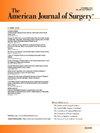Comparative value of frailty versus ECOG performance in preoperative risk assessment for elderly patients with gastric cancer
IF 2.7
3区 医学
Q1 SURGERY
引用次数: 0
Abstract
Background
Radical gastrectomy with D2 lymphadenectomy reduces the postoperative recurrence in gastric cancer, but increases risk of complications, especially among elderly patients. This study aimed to assess the predictive value of frailty in determining postoperative complication risks in patients aged ≥80 years undergoing D2 gastrectomy.
Methods
This prospective observational study enrolled 78 patients aged ≥80 years who underwent gastrectomy with D2 lymphadenectomy for gastric cancer between January 2020 and December 2021 at a medical center in Taiwan. Frailty was evaluated using the Comprehensive Geriatric Assessment (CGA) within one week before surgery. Outcomes: Length of hospital stay (LOS), intensive care unit (ICU) stays, postoperative complications, and survival were analyzed and compared with the Eastern Cooperative Oncology Group (ECOG) performance status.
Results
Among the 78 patients, ECOG performance scores were 0, 1, 2, and 3 in 47 %, 40 %, 12 %, and 1 % of patients, respectively; 19 patients (24 %) were classified as fit and 59 (76 %) as frail based on CGA. Frail patients had a significantly longer median LOS (20 days vs. 12 days, p = 0.001), a higher ICU admission rate (46 % vs. 16 %, p = 0.027), a higher incidence of any surgical complication (85 % vs. 47 %, p = 0.001), and an increased rate of major surgical complications (Accordion grade 2 or higher) (24 % vs. 0 %, p = 0.012) compared to fit patients. Although ECOG performance was associated with major complication rates, it did not significantly predict LOS, ICU admissions, or overall complication rates. Survival did not differ significantly between the frail and ECOG performance groups.
Conclusions
This study demonstrates that frailty is commonly observed in Taiwanese octogenarian patients and is a valuable predictor of postgastrectomy outcomes.
衰弱与ECOG表现在老年胃癌患者术前风险评估中的比较价值
背景:根治性胃切除术联合D2淋巴结切除术减少了胃癌术后复发,但增加了并发症的风险,尤其是在老年患者中。本研究旨在评估衰弱在确定≥80岁D2胃切除术患者术后并发症风险中的预测价值。该前瞻性观察研究纳入了78名年龄≥80岁的患者,这些患者于2020年1月至2021年12月在台湾一家医疗中心接受了胃切除术和D2淋巴结切除术。术前一周采用综合老年评估(Comprehensive Geriatric Assessment, CGA)评估虚弱程度。结果:分析住院时间(LOS)、重症监护病房(ICU)、术后并发症和生存率,并与东部肿瘤合作组(ECOG)的表现状况进行比较。结果78例患者中,分别有47%、40%、12%、1%的患者ECOG表现评分为0、1、2、3分;基于CGA, 19例患者(24%)被分类为健康,59例(76%)被分类为虚弱。与健康患者相比,体弱患者的中位生存期明显更长(20天对12天,p = 0.001), ICU住院率更高(46%对16%,p = 0.027),任何手术并发症的发生率更高(85%对47%,p = 0.001),主要手术并发症(Accordion 2级或以上)的发生率更高(24%对0%,p = 0.012)。尽管ECOG表现与主要并发症发生率相关,但它不能显著预测LOS、ICU入院率或总并发症发生率。体弱组和ECOG表现组的生存率无显著差异。结论本研究显示,台湾八旬高龄患者普遍存在虚弱,是胃切除术后预后的重要预测指标。
本文章由计算机程序翻译,如有差异,请以英文原文为准。
求助全文
约1分钟内获得全文
求助全文
来源期刊
CiteScore
5.00
自引率
6.70%
发文量
570
审稿时长
56 days
期刊介绍:
The American Journal of Surgery® is a peer-reviewed journal designed for the general surgeon who performs abdominal, cancer, vascular, head and neck, breast, colorectal, and other forms of surgery. AJS is the official journal of 7 major surgical societies* and publishes their official papers as well as independently submitted clinical studies, editorials, reviews, brief reports, correspondence and book reviews.

 求助内容:
求助内容: 应助结果提醒方式:
应助结果提醒方式:


